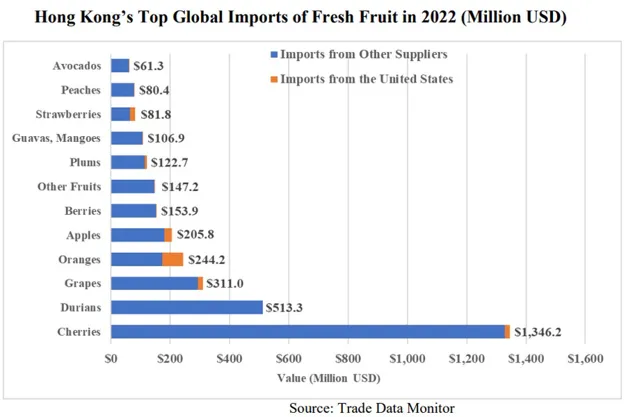In 2022, Hong Kong agricultural production (livestock and crops) yielded about $173 million worth of fresh food. Hence, Hong Kong relies on imports of fresh produce to feed its 7.3 million residents. The openness of the Hong Kong food import regime and its well-traveled consumers who demand a wide range of fruit offerings, make this city a great and competitive export destination for fresh fruit.
Hong Kong imports
In 2022, Hong Kong’s global fresh fruit imports decreased 18 percent to $3.7 billion compared to 2021. This overall downward trend continued during the first ten months of 2023 with imports dropping 27 percent year-on-year. The United States was the fifth leading supplier, supplying five percent of the city’s overall fruit imports. Since 2018, Hong Kong’s fruit market has been dominated by Chile and Thailand. Imports of Chilean cherries have taken up to 82 percent of Chile’s total fruit sales to Hong Kong.
Although the United States also supplies cherries, Chilean cherries have a different seasonality than U.S. cherries. U.S cherries ripen between April to July, while Chilean cherries ripen during the winter season. As Hong Kong families usually have a couple of celebrations in the winter (namely, Christmas, New Year, and Lunar New Year), fruits are popularly used in family gatherings or as gifts. Therefore, there is a huge demand for premium and quality fruits during this period. On the other hand, Thai durians comprise 76 percent of Thailand’s fruit sales to the city. Hongkongers have a special preference for this tropical fruit for its authentic taste, soft texture, and sweet flavor. As not many global suppliers grow durians, Thailand has dominated this market, and its share of overall fruit sales continues to grow. While U.S. oranges almost dominate the Hong Kong market, U.S. fruit sales are distributed evenly among other fruits like apples, cherries, grapes, and strawberries.
Click here to read the full report.
Source: fas.usda.gov

